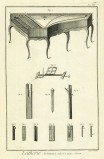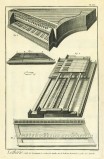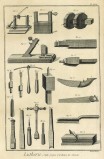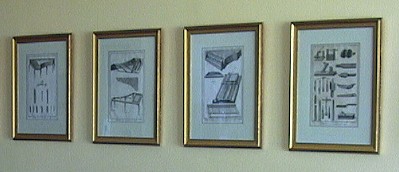
WIKIMEDIA COMMONS / PUBLIC DOMAIN
 WIKIMEDIA COMMONS / PUBLIC DOMAIN |
| Denis Diderot (1713–1784) |
Under the direction of Denis Diderot (1713–1784), over 140 of the greatest minds of pre-Revolution France—including Voltaire, d’Alembert and Rousseau—contributed the tens of thousands of articles to make the Encyclopédie ou Dictionnaire raisonné des sciences, des arts et des métiers, par une Société de Gens de lettres (Encyclopedia or Systematic Dictionary of the Sciences, the Arts, and the Professions…). A mammoth work of around seventeen million words, it was a compendium of human knowledge and achievement.
Censorship of various articles deemed treacherous or heretical meant the publication was to proceed sporadically. The second volume was ordered to be burnt within days of its release in 1752, and five years later the death penalty was proscribed for authors penning seditious text and those publishers responsible for its dissemination. It was to be a quarter century from the publication of the first text volume of seventeen in 1751 to the final of eleven volumes of plates in 1772.
For the English world, Encyclopædia Britannica was not to make an appearance until 1768, with its first edition complete within four years.
From the original Encyclopédie, the elegantly-engraved plates for Lutherie are of particular interest to instrument makers. Four of the plates are directly relevant to the harpsichord, and are reproduced here by direct scans of the original edition engravings in my library.
 |
Plate XIV Lutherie, Instruments à cordes et à touches. Clavecin. Harpsichord without lid, |
|
|||
 |
Plate XV Lutherie, Instruments à cordes et à touches. Suite du Clavecin. Internal bracing, soundboard ribbing, |
||||
 |
Plate XVI Lutherie, Instruments à cordes et à touches, Spinet, psaltery, double-manual keyframes, |
||||
 |
Plate XVII Lutherie, Outils propres à la Facture des Clavecins. Various tools of the harpsichord maker, |
||||
 Each trade was protective of its “secrets” in order to ensure its
controlled survival under the guild system, and harpsichord making was no exception.
As a result, the rendering of the internal case bracing and soundboard ribbing
of the French Double Harpsichord shown in the Lutherie plate XV was merely
an artist’s perception. No instrument looks like that inside!
Each trade was protective of its “secrets” in order to ensure its
controlled survival under the guild system, and harpsichord making was no exception.
As a result, the rendering of the internal case bracing and soundboard ribbing
of the French Double Harpsichord shown in the Lutherie plate XV was merely
an artist’s perception. No instrument looks like that inside!
It would seem Diderot’s artist was not permitted to view the interior of the instrument under construction, such things being for the eyes of guild members only. Perhaps for the sake of completion, the artist had to use conjecture to draw the interior from the very general description provided in the text. This might have provided sufficient information to whet a dilettante’s appetite, but not enough to enable a durable and effective instrument to be built. And it could make one question the reliability or at least the completeness of the other arts figured in the Encyclopédie.
From this, one should perhaps also be a little cautious of the written word with or without authoritative illustrations, whether appearing in print or even on the internet…
| Site overview | |
| Harpsichords Australia Home Page |